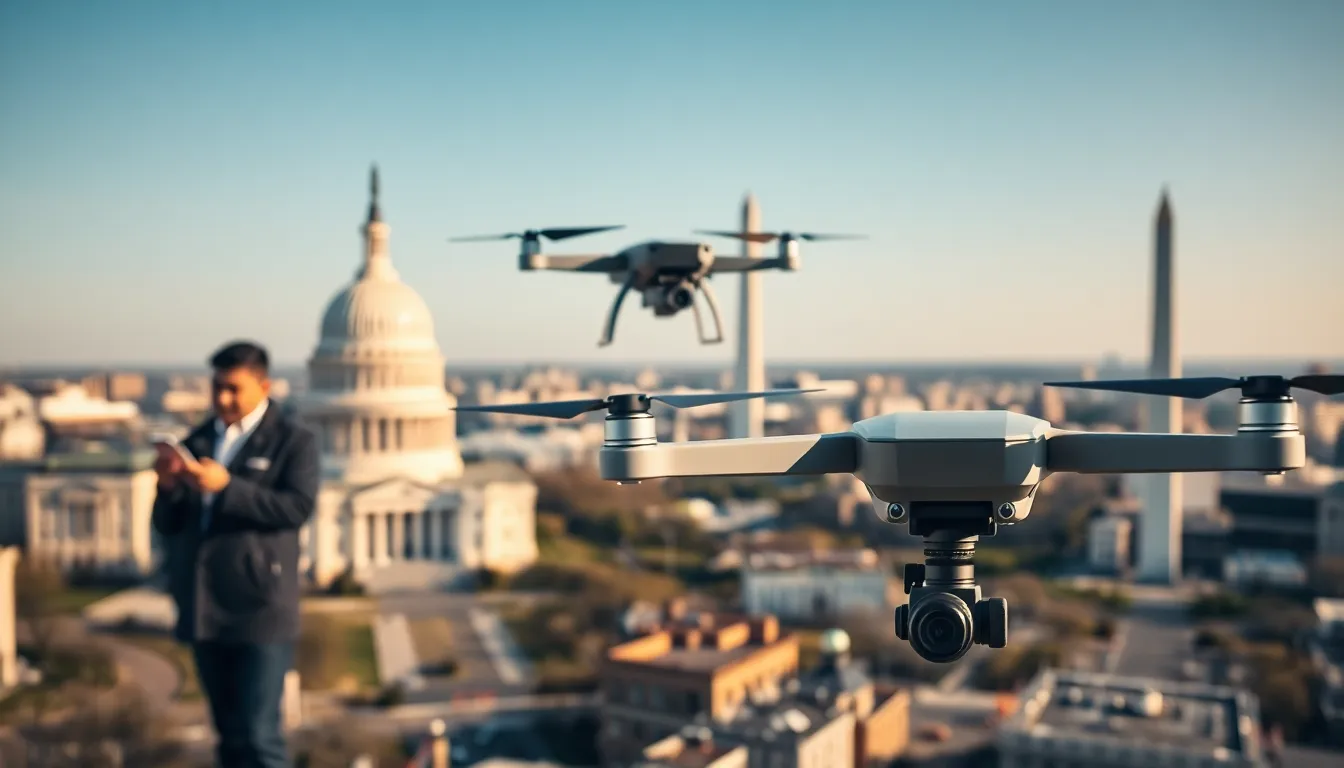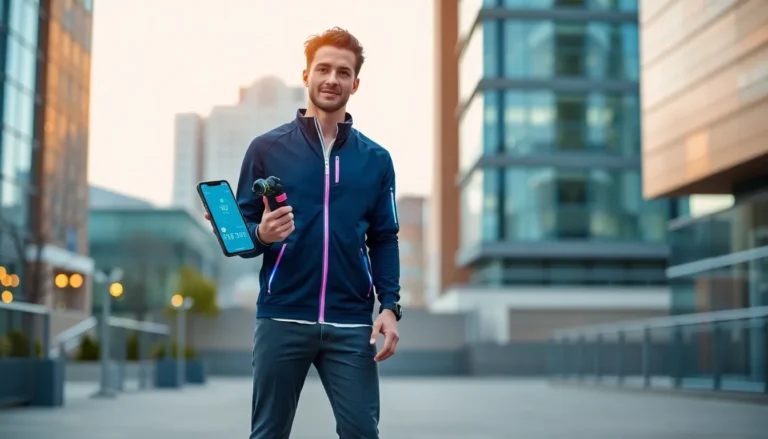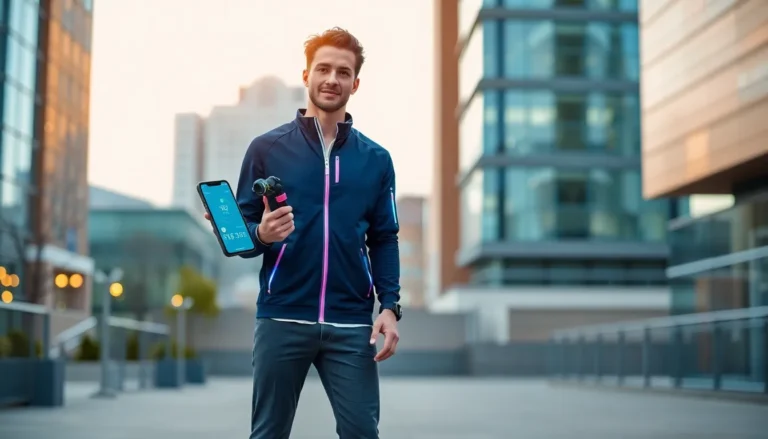Imagine this: You’re sitting by the National Mall, when out of nowhere, a tiny drone zooms past. Is it capturing your good side for Instagram or spying on you? In D.C., drones aren’t just for gaming nerds or high-tech enthusiasts: they’re reshaping how cities operate. With applications ranging from public safety to media coverage, these flying gadgets are changing the urban landscape, both figuratively and literally. But like any technology that flies high, they come with their own set of regulatory hurdles and public concerns. Buckle up as we explore the thrilling world of drones in D.C.
Table of Contents
ToggleThe Evolution Of Drones In Urban Environments

History And Development Of Drones
Drones, also known as unmanned aerial vehicles (UAVs), first took flight in military contexts. The early 1900s saw their inception primarily for reconnaissance missions. As technology progressed, the scope of drones expanded, transitioning from military to civilian applications. The 21st century marks a significant turning point. Consumer drones swiftly gained popularity, which paved the way for their integration into urban environments.
In cities worldwide, drones began performing tasks that humans previously managed, from deliveries to photography. The drone revolution wasn’t just limited to sunny skies or serene countrysides: it was racing straight into bustling metropolises. D.C., with its unique mix of government, tourism, and infrastructure, stands at the forefront of this development.
Significant Milestones In D.C.
D.C. has seen its fair share of key drone milestones. In 2015, the Federal Aviation Administration (FAA) implemented regulations that formally opened the skies to hobbyist drones, setting a precedent for future applications. Simultaneously, various specialized drone companies emerged, offering services tailored for urban settings. One notable event is the use of drones for surveying the damage after natural disasters, proving their worth in crisis management. Each of these milestones has not just illustrated the growth of drone technology but has also influenced policy and public opinion profoundly.
Current Applications Of Drones In D.C
Public Safety And Law Enforcement
Law enforcement agencies in D.C. have harnessed drone technology to enhance public safety. With their ability to provide aerial surveillance, drones assist in monitoring large gatherings, like protests or parades. This not only helps maintain order but also reduces the risks associated with deploying officers in potentially dangerous situations. Studies show that drones can cover vast areas rapidly, providing real-time data that keeps citizens informed and safe.
Infrastructure Inspection And Maintenance
Also, infrastructure inspection is another significant application of drones in D.C. The nation’s capital has numerous historical sites and aging structures, including the iconic monuments and bridges. Drones equipped with high-resolution cameras can conduct detailed inspections much faster than human crews, saving time and costs. This tech effectively identifies wear and tear in infrastructures that may otherwise go unnoticed until it’s too late.
Event Coverage And Media Use
Media outlets have jumped on the drone bandwagon, utilizing them for event coverage to provide dynamic perspectives. Imagine capturing the cherry blossoms blooming from thousands of feet up: drones offer unique views that traditional cameras simply can’t. Not only do they elevate storytelling, but they also engage viewers on platforms like social media, transforming plain live reports into captivating visual experiences.
Regulatory Landscape Governing Drones In D.C
Federal Regulations And Guidelines
Navigating the regulatory landscape for drones in D.C. can feel like traveling through a maze. At the federal level, the FAA has set stringent regulations that include restrictions on where and how drones can be flown. For instance, areas near the White House and other government buildings are no-fly zones, ensuring security is prioritized.
Local Laws And Restrictions
On the local front, D.C. has implemented additional regulations to address community concerns. The District Department of Transportation (DDOT) has its own set of guidelines, aimed at balancing innovation with public safety. Registration is required, and there’s a focus on ensuring that drones don’t infringe on personal privacy, illustrating the need for responsible piloting amidst technological advancement.
Challenges And Controversies Surrounding Drones
Privacy Concerns And Public Perception
Even though their benefits, drones spark plenty of controversy. Privacy concerns are among the most pressing issues, with many arguing that drones could invade personal spaces. Citizens often wonder whether they are being monitored during their daily activities. Public perceptions of drones can vary greatly, from technological marvels to intrusive gadgets flying over their heads.
Air Traffic Management And Safety Risks
Air traffic management also presents challenges in crowded urban skies. With more drones taking to the air, ensuring they don’t collide with commercial or private aircraft becomes crucial. The FAA, along with local authorities, constantly develops tools and strategies to manage this growing traffic while ensuring safety isn’t compromised. It’s a delicate balance between innovation and risk management.
The Future Of Drones In D.C
Innovations And Technological Advances
The future of drones in D.C. is bursting with potential. Innovative developments in artificial intelligence and machine learning are set to enhance drone capabilities. Imagine drones that can autonomously navigate complex urban environments without any human intervention. The ability to analyze data on-the-fly and adapt to unforeseen situations provides exciting possibilities.
Potential Expansions And New Applications
Also, the applications of drones are projected to expand even further. Cargo deliveries in urban areas could soon become the norm. Companies like Amazon are already testing delivery drones in select areas, and D.C. could be next in line. With further advancements, drones will pave the way for smarter cities and efficient logistics, making urban life more convenient.


